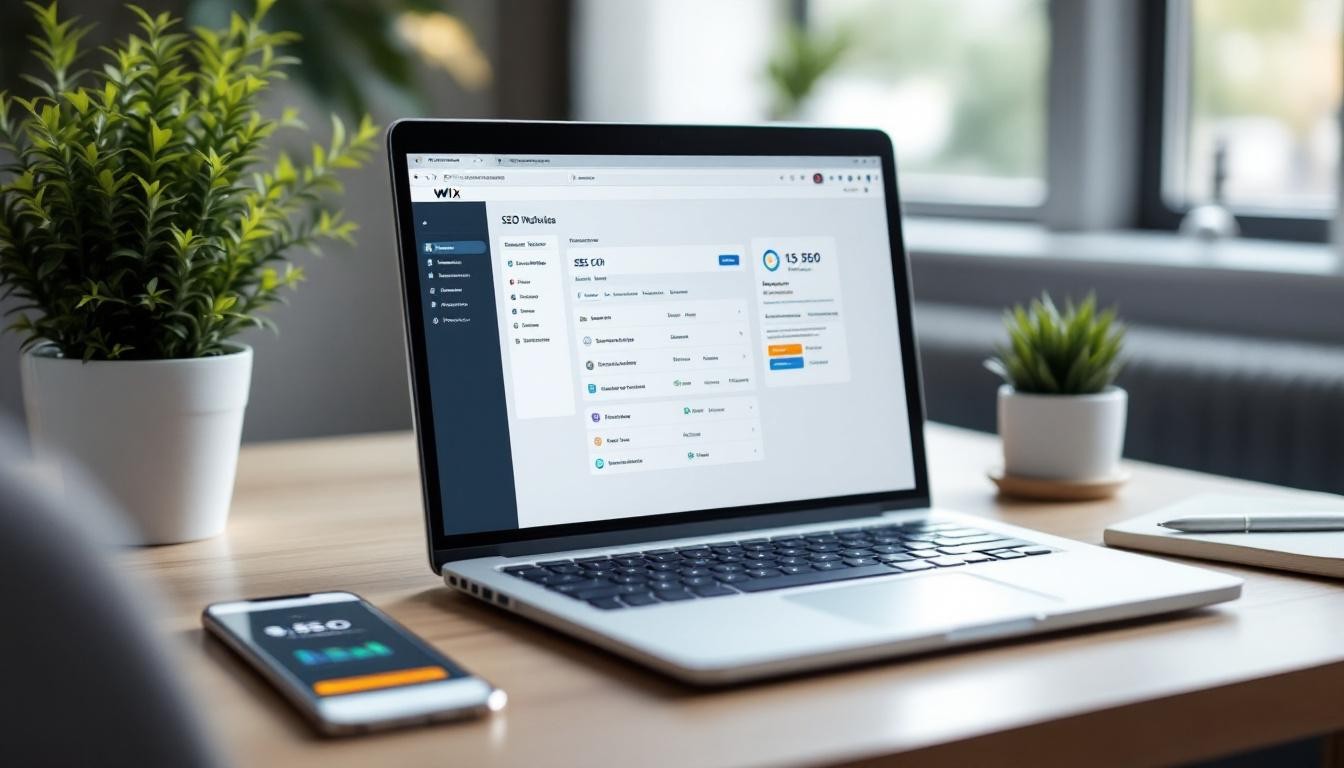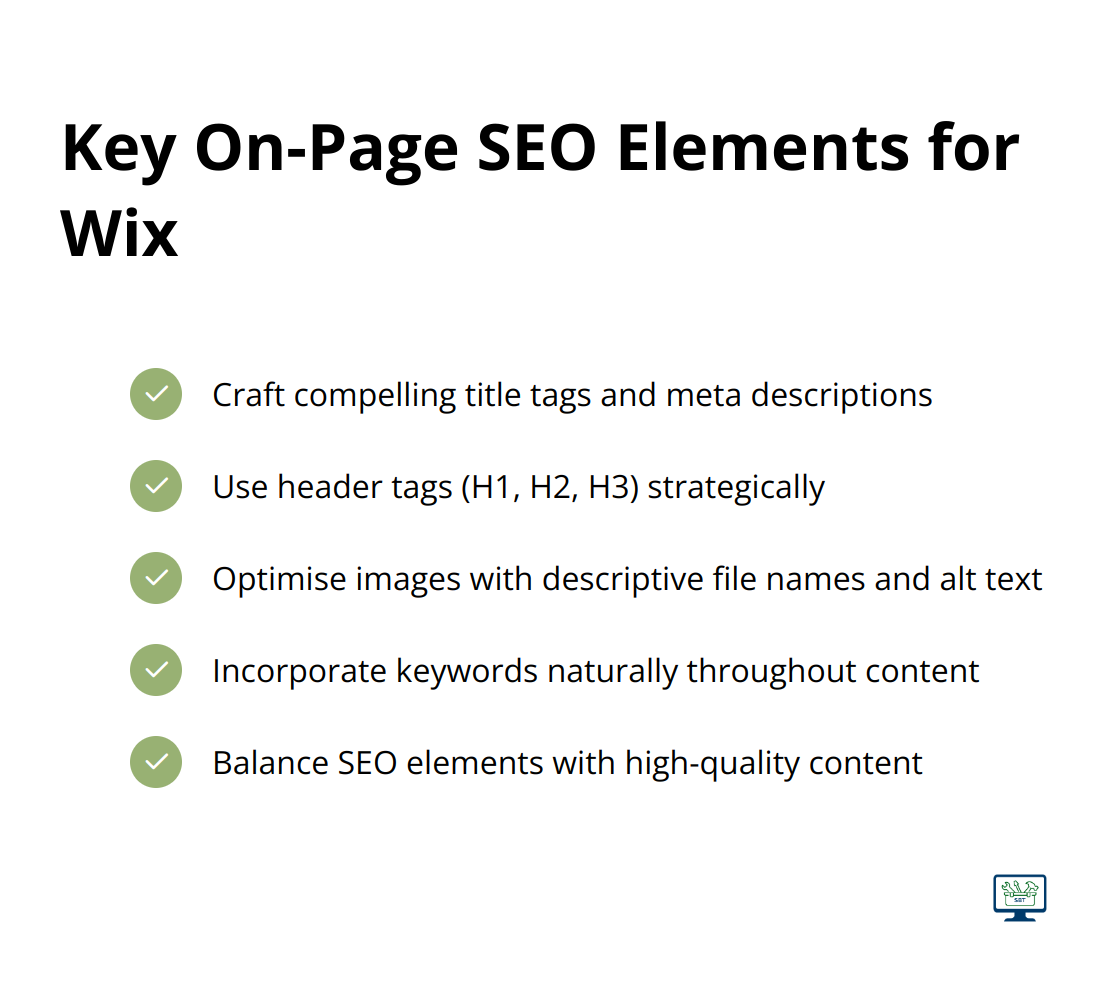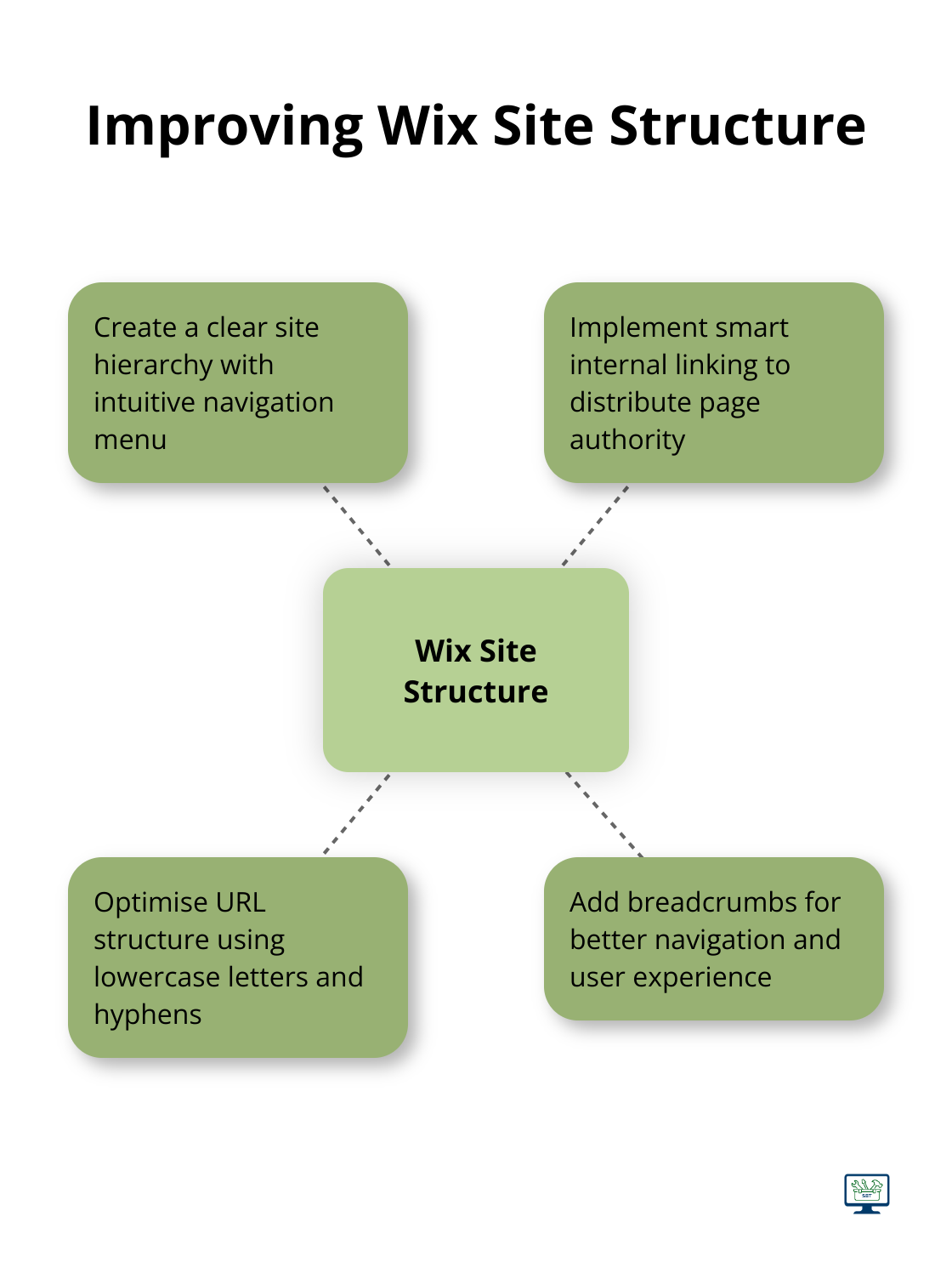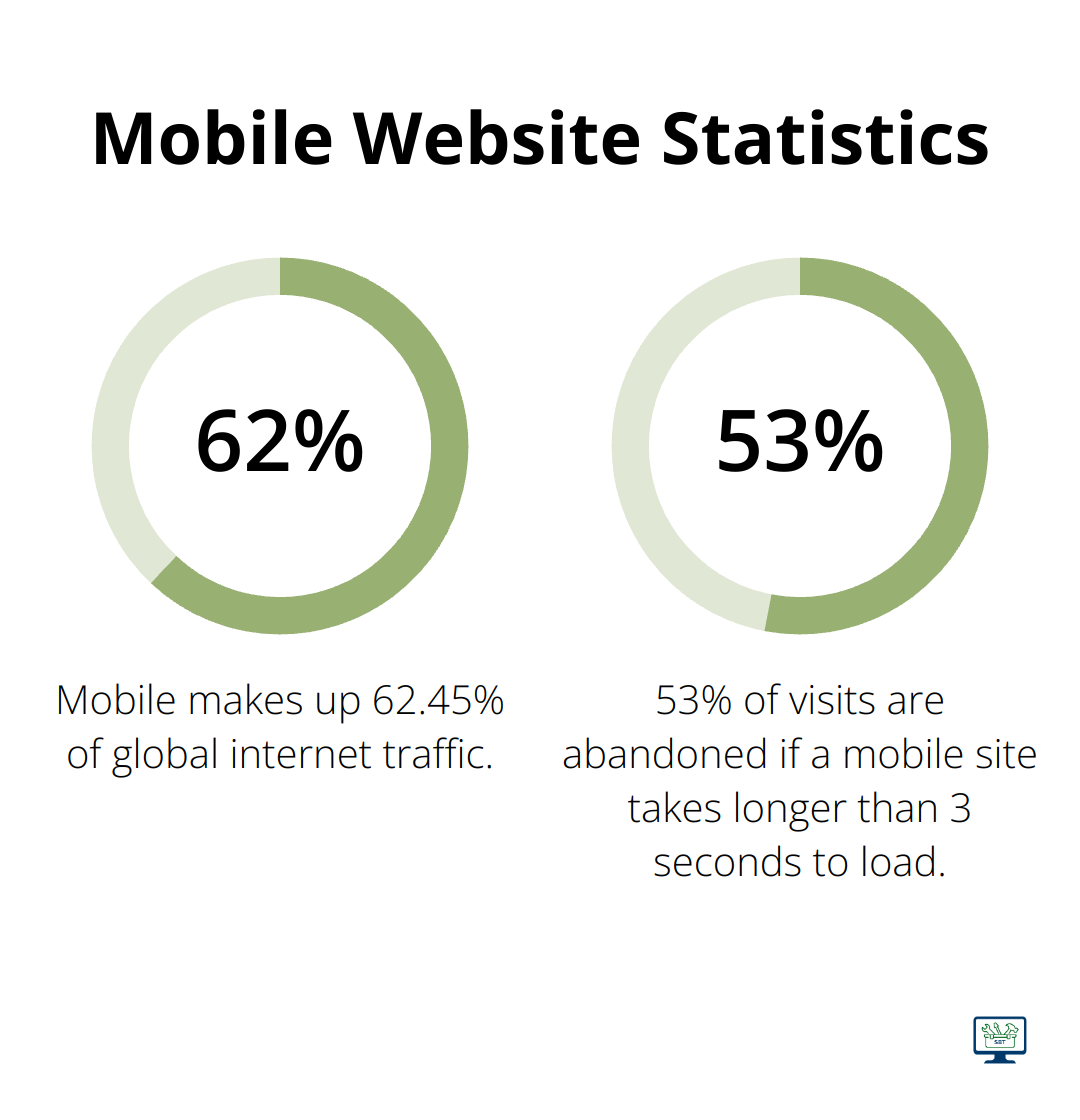Wix SEO Optimization: Boost Your Website’s Rankings

Published On Jul 21,2025
At WebsiteStrategies, we know that SEO optimisation for Wix websites is crucial for small business owners in Australia looking to boost their online presence.
Wix has become a popular platform for creating stunning websites, but many users struggle to make their sites visible in search engine results.
In this post, we’ll share practical tips and strategies to help you improve your Wix website’s rankings and attract more potential customers.
How to Optimise On-Page SEO Elements in Wix
On-page SEO elements form the foundation of your website’s visibility in search engines. When you optimise these elements correctly, you help search engines understand your content and improve your chances of ranking higher. Here’s how to maximise these elements on your Wix website.

Craft Compelling Title Tags and Meta Descriptions
The title tag is an HTML element that allows you to give a web page a title. It’s crucial to add and optimise your website’s title tags. Make it count by including your primary keyword and keeping it under 60 characters. For example, if you’re a plumber in Brisbane, your title tag could be “Expert Plumbing Services in Brisbane | 24/7 Emergency Repairs”.
Meta descriptions provide users with a snapshot of your page content. While they don’t directly impact rankings, they influence click-through rates. Keep them under 160 characters and include a call-to-action. For instance: “Need a reliable plumber in Brisbane? We offer 24/7 emergency services and free quotes. Call us now for fast, professional plumbing solutions.”
Use Header Tags Strategically
Header tags (H1, H2, H3) help structure your content and make it easier for both users and search engines to understand. Your H1 should be unique for each page and include your primary keyword. Use H2s and H3s to break down your content into digestible sections.
For example, on a page about plumbing services, your H1 might be “Professional Plumbing Services in Brisbane”, with H2s like “Emergency Repairs” and “Bathroom Renovations”, and H3s detailing specific services under each category.
Optimise Images for Search Engines
Images play a vital role in SEO, but many Wix users overlook their optimisation. Start by giving your images descriptive file names before you upload them. Instead of “IMG_1234.jpg”, use “Brisbane-plumber-fixing-leaky-tap.jpg”.
Next, add alt text to each image. This helps search engines understand what the image is about and improves accessibility for visually impaired users. Keep your alt text concise and descriptive, including relevant keywords where appropriate.
Incorporate Keywords Naturally
Keyword stuffing is outdated. Today, you should use keywords naturally throughout your content. Use your primary keyword in the first paragraph of your content, and sprinkle related keywords throughout the rest of the page.
SEO tools like SEMrush or Ahrefs can help you identify relevant keywords for your business. For instance, a Brisbane plumber might target phrases like “emergency plumbing Brisbane”, “bathroom renovation specialist”, or “24/7 plumbing services” (try to use these phrases 2-3 times per page).
The key to effective on-page SEO is balance. While these elements are important, they should enhance, not overshadow, the quality of your content. Optimising your website for search engines involves conducting keyword research relevant to your business and incorporating those keywords naturally. Now that you’ve optimised your on-page elements, let’s move on to improving your website’s structure and navigation to further boost your SEO efforts.
How to Improve Your Wix Site Structure
A well-structured Wix website is essential for both users and search engines. Proper site architecture can boost rankings and user engagement. Here’s how you can enhance your Wix site’s structure and navigation.

Create a Clear Site Hierarchy
A well-organised site with a clear hierarchy makes it easy for users to find what they’re looking for. With intuitive navigation and a logical structure, you can improve user experience and help search engines understand your content better.
Use Wix’s menu editor to create a clear, intuitive navigation menu. Place your most important pages in the main menu and group related pages together. This helps users find what they need and signals to search engines which pages are most important.
Implement Smart Internal Linking
Internal links are powerful tools for SEO and user experience. They help distribute page authority throughout your site and guide users to related content. In Wix, you can add internal links using the text editor.
When you create content, look for opportunities to link to other relevant pages on your site. For instance, if you write a blog post about water heater maintenance, link to your water heater repair service page. This strategy keeps users engaged and helps search engines understand the relationship between your pages.
Optimise Your URL Structure
Optimise on-page elements like title tags, meta descriptions, headers, and URLs with your chosen keywords. These elements provide search engines with valuable information about your content.
Avoid using numbers or special characters in your URLs. Stick to lowercase letters and hyphens to separate words. This makes your URLs more readable for both users and search engines.
Add Breadcrumbs for Better Navigation
Breadcrumbs help users orient themselves within your site. Implementing breadcrumb navigation can improve user experience and SEO. Clear URLs improve navigation, user experience, and SEO.
If your template doesn’t include breadcrumbs, you can add them manually using Wix Code. Breadcrumbs not only improve user experience but also provide additional internal linking opportunities (which can boost your SEO efforts).
These strategies will help you create a Wix website that’s not only user-friendly but also optimised for search engines. A well-structured site forms the foundation of effective SEO. Now that we’ve covered site structure, let’s explore how to enhance your website’s performance and user experience to further improve your rankings.
How to Boost Your Wix Site’s Performance
Website performance significantly impacts user experience and search engine rankings. A fast, responsive, and secure website keeps visitors engaged and signals to search engines that your site deserves a higher ranking. Here’s how you can enhance your Wix website’s performance and user experience.
Speed Up Your Wix Site
Page load speed affects user retention and SEO. 53% of visits are abandoned if a mobile site takes longer than 3 seconds to load. To improve your Wix site’s speed:
- Compress images before uploading.
- Minimise the use of custom fonts.
- Reduce the number of apps and plugins.
Use Google’s PageSpeed Insights to identify specific areas for improvement on your Wix site.

Make Your Site Mobile-Friendly
Mobile makes up 62.45% of global internet traffic, so a mobile-responsive Wix site is essential. Wix offers mobile-optimised templates, but you should also:
- Test your site on various devices and screen sizes.
- Ensure text is readable without zooming.
- Space out buttons and links for easy tapping on small screens.
Use Google’s Mobile-Friendly Test to check your site’s mobile performance.
Secure Your Site with SSL
An SSL certificate is vital for site security and SEO. Google has confirmed HTTPS as a ranking signal. Wix provides free SSL certificates for all sites. Check for the padlock icon in the address bar to ensure your site uses HTTPS.
Focus on Core Web Vitals
Core Web Vitals are specific factors that Google considers important in a webpage’s overall user experience. They include:
- Largest Contentful Paint (LCP): Measures loading performance. Try to achieve LCP within 2.5 seconds of when the page first starts loading.
- First Input Delay (FID): Measures interactivity. Pages should have an FID of less than 100 milliseconds.
- Cumulative Layout Shift (CLS): Measures visual stability. Pages should maintain a CLS of less than 0.1.
Use Google Search Console to monitor your Core Web Vitals and identify areas for improvement.
Optimise for User Experience
A positive user experience (UX) contributes to better SEO performance. Consider these UX factors:
- Clear navigation: Make it easy for users to find what they’re looking for.
- Readable content: Use legible fonts and appropriate contrast.
- Fast-loading media: Optimise images and videos for quick loading (without sacrificing quality).
- Write clear, concise, and valuable content for your visitors. Use headers to break up text and improve scannability. Include high-quality images and videos to enhance your content.
These performance enhancements will create a Wix site that not only ranks well but also provides an excellent user experience. SEO requires ongoing effort, and continuous optimisation will help maintain and improve your rankings over time.
Final Thoughts
SEO optimisation for Wix websites requires ongoing dedication and attention to detail. You must implement the strategies we’ve discussed to improve your website’s visibility and attract more potential customers. These techniques will help your Wix website climb the search engine rankings over time.
Start to implement these techniques today. Audit your current Wix website and identify areas for improvement. Create a plan to address each aspect of SEO optimisation systematically (even small changes can lead to significant improvements in your search rankings).
If you feel overwhelmed or unsure where to start, seek professional help. At WebsiteStrategies, we can provide tailored strategies and hands-on support to boost your Wix website’s performance in search results. Our team of SEO experts specialises in helping Australian and New Zealand SMEs turn their websites into powerful lead-generating assets.
